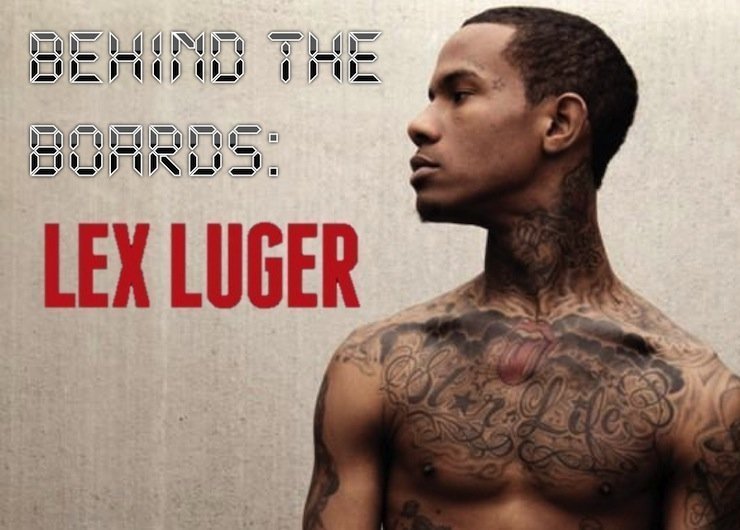In this weekly feature, we’re profiling the unsung heroes of hip hop music: the producers. These musicians, responsible for creating beats, sampling and collaborating with MCs, slave away behind the scene while rappers get most (if not all) of the credit. With Behind The Boards, we’re looking to shine the spotlight on the best producers in the game.

Although Lex Luger (Born Lexus Lewis) is only 22, it's already been three years since he first popped up on the U.S. Rap Charts as the producer of Waka Flocka Flame's "Hard in da Paint." Luger, who took his stage name from a former pro wrestler, developed a distinct sound at a young age, and after other rappers heard his ominous trap beats, became one of the most in-demand beatmakers of 2010 and '11. Lately, he's tried to expand his range, focusing on other sounds and working with a wider array of rappers. His most recent release paired him with co-producer A-Trak (the subject of our last "Behind The Boards" article) and up-and-comers PeeWee Longway and Young Thug on a song called "Jack Tripper." Read on to learn of Luger's rise to fame, and of his subsequent navigation of an increasingly fertile playing field.
From the Basement to the Brick Squad
Growing up in Suffolk, Virgina, Luger's first introduction to music was playing drums for a number of bands at his local church. When he was a bit older, he got his hands on a Playstation 2 game called MTV Music Generator 3, and could not get enough of it. The breakthrough moment came when Luger's friend brought him a pirated copy of a computer program called Fruity Loops that had an interface remarkably similar to the Playstation game with which he was familiar. Saving up for an Akai MPC 2500 and founding the VABP (Virginia Boyz Productionz) production crew with his friends, Luger was ready to try his hand at making pro-quality beats.
Spending long days experimenting with Fruity Loops in his parents' basement, Luger dropped out of high school after 10th grade after realizing his prowess for churning out beats at an extraordinary pace. Around late 2008, he began cold-emailing his beats to various rappers and posting instrumentals on his Myspace page, hoping to gain exposure. Below, watch an early video of Luger working his magic.
In 2009, a rapper from Atlanta named Waka Flocka Flame (who hadn't released anything at that point) emailed back, expressing interest in a particularly vicious beat, and requesting some more from Luger. The young producer, who's become known for making song-length instrumentals in less than ten minutes, responded with hundreds more, and eventually Waka flew him out to Atlanta to work with him.
Camped out in Waka's basement with no internet access, the two worked tirelessly on what would become the bulk of Flockaveli, Waka's debut album. Not knowing the future of his work with Waka, Luger returned home "broke as a joke," expecting his second child and seriously contemplating a warehouse job to support his yet-to-be-fruitful production career. Then, out of the blue, he heard a beat that he made for Waka on the radio in May 2010. It was "Hard in da Paint," the first harbinger of success for Luger. Hear that song below.
The smash single paired frenetic hi-hat triplets with a booming 808 bass drum and a downright scary simulated brass ensemble. It, along with Waka's rhymes, was simplistic, utilitarian and austere. The concept of "trap music" (music of, by and for the "trap," AKA a house out of which drugs are dealt) had been around since the early 2000s, with T.I.'s 2003 album Trap Muzik being the genre's watershed moment, but "Hard in da Paint" marked the dawn of a new incarnation of the style. In a 2011 article on Luger in the New York Times, critic Alex Pappademas described this change in sound best: Luger was making "dope-slinging music that somehow evokes greater crimes — like regicide, maybe."
Earlier trap producers had dabbled in using strings, operatic vocals and ominous basslines, but Luger moved these sinister-sounding elements to the forefront of his music, and forever changed the genre. Shortly after singles from Flockaveli began making waves, Waka signed Luger to his Brick Squad Monopoly imprint of Gucci Mane's 1017 Brick Squad label.
From "B.M.F." to B.M.O.C.
Before the month was out, Luger had gotten requests from rappers such as Ace Hood, Fabolous, Soulja Boy and Rick Ross, the latter of whom released the Luger-produced single "B.M.F. (Blowin' Money Fast)" in June 2010. Using many of the same elements as "Hard in da Paint," the song was also a smash success, with both forming pillars of the hip-hop zeitgeist in mid-2010. Listen to "B.M.F." below.
This is where things started getting a little crazy for Luger. As someone whose primary musical tool was a Compaq laptop and software valued at $250, his style was easily imitated, and so in late 2010, a bunch of copycats crafting "Lex Luger-style beats" popped up on YouTube, and "Lex Luger Drum Kits" became available on nearly every hip-hop production forum. This, coupled with requests from rappers like Chingy, Busta Rhymes and Sean Garrett for "B.M.F." or "Hard in da Paint"-style beats, led Luger to become paranoid of producing a ton of similar-sounding beats. No artist wants to get into a rut, but it was hard to ignore the popular demand that he was experiencing. In early 2011, a 19-year-old Luger told Complex:
"When I’m sending out 40 beats a day to one artist, out of those 40 he might pick two just because they sound like ‘B.M.F.’ or ‘Hard in da Paint,’ and he feels like that’s his hit. I think that’s a big problem in music right now. Everybody is like, ‘Oh, he’s hot right now. I’m going to try and get something that sounds like him.’ And that’s what I feel like a lot of artists did to me because Waka was really the biggest thing at one time. So they wanted that ‘Hard in da Paint’ sound. And I was just the man behind that, so they reached out to me. So when I sent them other types of music, they were like ‘What is this?’ I want ‘B.M.F.’ or ‘Hard in da Paint. Don’t send me this.’ So what I try to do now is, I try and hold the ‘B.M.F.’ and ‘Hard in da Paint’ sound to myself. I won’t send that out. I’ll send the pop music or the R&B out to the major artists so they have to do it.”
Salvation came, as it often does for young hip-hop artists, in the form of Kanye West. Luger got a call one day from a man who seemed very interested in his music, and after thirty minutes on the phone, he realized it was West. Soon, he was on a flight to New York to meet up with West at Electric Lady Studios. When he arrived, he quickly realized that he was not there to recreate his previous radio smashes. Kanye set Luger up in the studio, telling him to work on beats, while he went into another room to work on vocals. When Luger entered after a few hours, he found Beyoncé and Jay Z sitting there, admiring his beat, atop which now sat some vocals by Bey. Jay Z said, "You made it now. You got Beyoncé bopping to your beats." The resulting track was much sunnier than anything Luger had produced before, but it still bore his hard-hitting percussion. Listen to "See Me Now," which ended up as a bonus track on West's 2010 album My Beautiful Dark Twisted Fantasy, below.
Kanye also ended up using another beat Luger laid down in those sessions for the song "H.A.M." that would appear on his and Jay's collaborative album Watch The Throne in 2011. This was a bit closer to the trap bombast of Luger's breakout singles, but with a bit of added flair from co-producer Kanye. By the end of 2011, he had made songs for Snoop Dogg, Lil Wayne, Wiz Khalifa, Juicy J, Gucci Mane and 2 Chainz, and won "Producer of the Year" at the BET awards. Luger was officially the big man on the vast campus that is popular hip hop.
What's Next?
In 2012 and 2013, Luger slowed down a bit. By Wikipedia's count, he had produced over 200 songs in 2011, and so making closer to 75 in 2012 can technically be considered "slow." He continued to branch out in terms of style, making his most minimal song yet for Schoolboy Q, and trying his hand at a poppy single with Drake and Waka. Listen to that latter song, "Round of Applause," below.
Last week, it was announced that Luger and A-Trak would be releasing a joint EP together under the name Low Pros. The first song off that project, "Jack Tripper" saw Luger marry his ominous trap style with A-Trak's bouncy electro, finally opting to participate in the cross-pollination of the trap and electronic genres that had been happening since 2012. Luger's larger-than-life beats helped inspire artists like TNGHT and Rustie to incorporate it into formats that were more commonly associated with electronic music, like club-ready instrumental tracks that stood alone, devoid of rappers. By contributing to a style that had originally taken inspiration from his earlier work, Luger had come full circle. Now 22, he's already had a career that many veteran producers couldn't even dream of, and he shows no signs of stopping.
Check out another Lex Luger-produced track, RiFF RAFF's "Raiders Vs. Hawks," right here on Zumic. Revisit our previous edition of "Behind The Boards" on A-Trak and head over to Luger's Zumic artist page for more background information on the young producer.















![image for article "Spirit" - Beyoncé (from Disney's The Lion King) [YouTube Music Video]](/img/resize/411x300/wp-content/uploads/beyonce-spirit-youtube-music-video.jpg)
